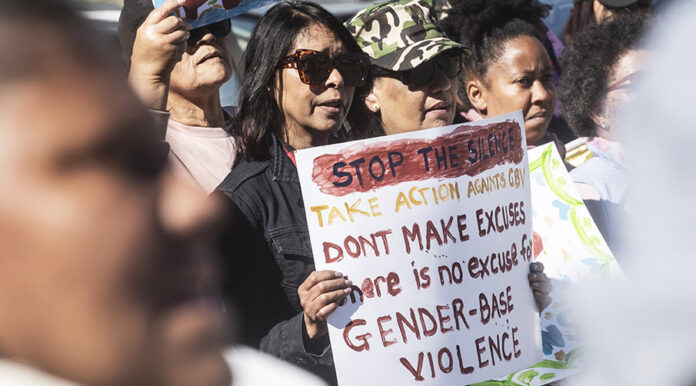This week, I stood flabbergasted while eavesdropping on a group of men critiquing speaker after speaker at an anti-GBV imbizo in rural Mpumalanga. As a social student, I wanted to lay low undetected, but as a journalist, I couldn’t hold my curiosity.
My shock and intrigue reached a boiling point when one man commented on the social services official who urged women to report gender-based violence whenever it raises its ugly head.
“Men often think that gender-based violence is only about physical violence,” the official had told the large crowd, to loud applause. “It is when a working man doesn’t buy groceries in the house, but he demands food when he returns from drinking. That is economic abuse.”
This provoked one of the men to shamelessly sneer: “Ba mo jisiye yewa.” He spoke in Sepulana, insinuating the speaker was under the influence of korobela (love potion). Others joined in, adding their own mockery. My blood boiled on an emotional Richter scale.
“But what does feeding your own family have to do with korobela, bafowethu?” I asked, smiling to lessen any sense of judgment.
“Women don’t want to see men happy,” one retorted. “They use the money you give them and still expect you to dig deep when groceries run out mid-month. We must also enjoy our money. Only men bewitched by korobela sacrifice every cent for women.”
Meanwhile, the official on stage pressed further: “If your husband demands you wash his clothes but hasn’t given you money for washing powder, that is economic and emotional abuse.
“You must report to social workers so we sit him down and explain that this is GBV.”
The men burst into laughter. One turned to me: “Are you married, my brother?”
I ventured: “Not according to home affairs or a lobola committee.”
They roared in laughter and launched into a lecture I supposedly needed. “The day you get married, you’ll realise a woman sometimes needs to know who’s boss. We don’t promote violence, but sometimes you must slap the lights out of her so she doesn’t get comfortable disrespecting you,” said one.
Later, reflecting on this disturbing exchange, I realised some men will never get the GBV messaging.
They are socialised to “reward” and punish women: ‘reward when it suits them, punish when their egos are tested. They physically assault, financially deprive, and feel entitled to sex whether their partners consent or not. In their minds, refusal equals infidelity, and rape
becomes their assertion of authority.
These types of men never attend a GBV talk to learn, only to ridicule. Never assume they are trapped in a “rural mindset”. Don’t believe that lack of qualifications makes them think non-violent men are bewitched.
They exist beyond the village. They are in the suburbs and plush estates. They wear suits, khakis, engineering uniforms and high court regalia. They sit in provincial legislatures drafting anti-GBV laws. They occupy seats in the National Assembly and even sit in the executive in government.
They could be you and I.
The only person I knew who could pierce such hardened ears was the late Bishop Israel Malele, a Mpumalanga preacher who reached men unmoved by gospel or social issues.
At a wedding, he thundered in Sepulana: “Mosadi a re teye, re a kissa (We don’t assault a woman, we kiss her).” His method shocked many.
They listened because he didn’t threaten arrest or castration. He offered an alternative to violence. He showed that men need not use their hands to harm but their lips to romance.
This is the challenge. Yes, we must expose GBV. But where are the alternatives?
We cannot bully or ridicule men into good behaviour. Perhaps we should change our language to include, not exclude. Exclusion breeds self-defence and backlash.
It is time for leaders to reconsider their approach. As the most misquoted scientist once said, “We cannot do the same thing over and over and expect different results.” We need to change the language. This article is deliberately raw to maintain its clarity of message. It is a conversation worth having.
• Mogakane is Mpumalanga correspondent



